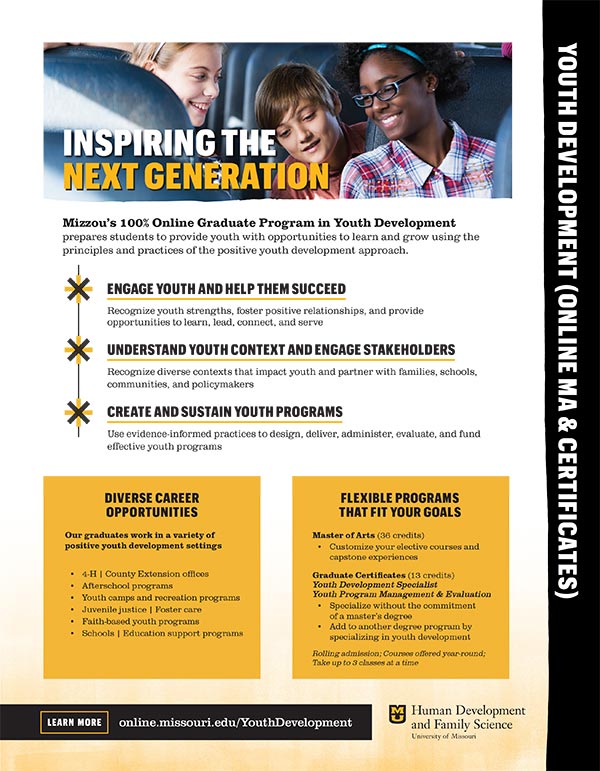The Master of Arts in Youth Development prepares students to provide youth with opportunities to learn and grow using the principles and practices of the positive youth development approach. Our graduates will:
ENGAGE YOUTH AND HELP THEM SUCCEED
Recognize youth strengths, foster positive relationships, and provide opportunities to learn, lead, connect, and serve
UNDERSTAND YOUTH CONTEXT AND ENGAGE STAKEHOLDERS
Recognize diverse contexts that impact youth and partner with families, schools, communities, and policymakers
CREATE AND SUSTAIN YOUTH PROGRAMS
Use evidence-informed practices to design, deliver, administer, evaluate, and fund effective youth programs
Coursework and Degree Requirements
Master of Arts – 36 total credits
The Youth Development program curriculum is designed to capture the needed competencies of of graduate-level youth professionals. Courses are organized below according to these professional competency blocks. Youth professionals work in a wide variety of settings so students are encouraged to choose elective courses that meet their own unique professional needs and goals.
Required Courses (27 credits, courses in bold)
Elective Courses (6-9 credits, choose additional courses from any block)
Block I – Foundational Skills in Positive Youth Development
- HDFS 7231: Foundations of Youth Development (3) a
- HDFS 8232: Youth Professionals as Consumers of Research (3) b
- HDFS 8240: Youth Development (3) b
Block II – Relational Dynamics and Positive Youth Development c
- HDFS 8234: Adolescents and their Families (3)
- HDFS 7210: Youth-Adult Relationships (3)
- HDFS 8237: Youth Culture and the Cultures of Youth (3)
- HDFS 8087: Adolescent Health & Sexuality (3)
- HDFS 7001: Youth, Sports, & Society (3)
Block III – Contexts of Youth Practice and Policy c
- HDFS 8236: Federal and State Policies that Impact Youth Development (3)
- HDFS 8239: Positive Youth Development in Community Settings (3)
- HDFS 7001: Youth Mental Health (3)
- HDFS 7001: Systems of Care for Youth at Risk (3)
Block IV – Youth Program Management, Evaluation, & Administration c
- HDFS 8235: Administration and Program Management *may be listed as Youth Personnel and Program Management
- HDFS 8238: Program Design, Implementation, and Evaluation *may be listed as Design and Evaluation of Youth Programs
- HDFS 7233: Basic Grant Development and Management (3)
Independent Capstone Effort
HDFS 8090: Project (3 hours)
a HDFS 7231 must be completed in the first semester of enrollment.
b HDFS 8240 and HDFS 8232 must be completed within the first one-two semesters of enrollment, may be taken concurrently with HDFS 7231 or other courses.
c Blocks II-IV are not sequential, students may take courses in these blocks in any order they choose.
~ Elective courses rotate and may not be offered every year, students are advised to consult their adviser and plan ahead; Other adviser-approved courses may be utilized
Note: Up to 6 credits can be transferred from other graduate programs, if your adviser deems the courses relevant to the YD program of study
Youth Program Management and Evaluation Certificate – 12 total credits
This graduate certificate works well as a stand-alone for those who want to enhance their skills and credentials in youth program leadership and sustainability. It can also pair well for those who are students in other Master’s or Doctoral programs at Mizzou seeking to add specialized youth programming skills to their training. The plan below is effective for those enrolled Fall 2021 and later.
Required Courses (9 credits)
- HDFS 7231: Foundations of Youth Development (3) a
- HDFS 8235: Administration and Program Management *may be listed as Youth Personnel and Program Management
- HDFS 8238: Program Design, Implementation, and Evaluation *may be listed as Design and Evaluation of Youth Programs
Select One of the Following Courses* – from curriculum Blocks III or IV only (3 credits)
- HDFS 8236: Federal and State Policies that Impact Youth Development (3)
- HDFS 8239: Positive Youth Development in Community Settings (3)
- HDFS 7001: Topics in HDFS – Youth Mental Health (3)
- HDFS 7001: Topics in HDFS – Systems of Care for Youth at Risk (3)
- HDFS 7233: Basic Grant Development and Management (3)
- HDFS 7001: Topics in HDFS – Youth, Families, & Technology (3)
a HDFS 7231 must be completed in the first semester of enrollment; may be taken concurrently with other courses
* Or any other adviser-approved course; only one non-YD elective course may be used on the Certificate Program of Study
Youth Development Specialist Certificate – 12 total credits
This graduate certificate works well as a stand-alone for those who want to enhance their skills and credentials in understanding and working directly with youth. It can also pair well for those who are students in other Master’s or Doctoral programs at Mizzou seeking to add specialized youth development knowledge skills to their training. The plan below is effective for those enrolled Fall 2021 and later.
Required Courses (6 credits)
- HDFS 7231: Foundations of Youth Development (3) a
- HDFS 8240: Youth Development b (3)
Select Two of the Following Courses* – from curriculum Blocks II or III only (6 credits)
- HDFS 8234: Adolescents and Their Families (3)
- HDFS 7210: Youth-Adult Relationships (3)
- HDFS 8237: Youth Culture and the Cultures of Youth (3)
- HDFS 8087: Seminar in HDFS – Adolescent Health and Sexuality (3)
- HDFS 7001: Topics in HDFS – Youth, Sports & Society (3)
- HDFS 8236: Federal and State Policies that Impact Youth Development (3)
- HDFS 8239: Positive Youth Development in Community Settings (3)
- HDFS 7001: Topics in HDFS – Youth Mental Health (3)
- HDFS 7001: Topics in HDFS – Systems of Care for Youth at Risk (3)
a HDFS 7231 must be completed in the first semester of enrollment
b HDFS 8240 must be completed within the first one-two semesters of enrollment, may be taken concurrently with HDFS 7231 or other courses
* Or any other adviser-approved course; only one non-YD elective course may be used on the Certificate Program of Study
Graduates from Youth Development work in a variety of settings. Get prepared to give youth the tools and opportunities they need to thrive!
- 4-H | County Extension offices
- Afterschool programs
- Youth camps and recreation programs
- Juvenile justice
- Foster care services
- Faith-based youth programs
- Schools and education support programs
The Online Youth Development program is flexible, affordable, and designed for you!
- 100% online, no campus visits required
- Flexible timeline to completion – continue to work while earning your degree
- Rolling admissions – courses offered year-round
- Customize electives to meet your professional goals
- Flat-rate tuition – no added distance or out-of-state costs
- Tuition reduction available for MU/Extension employees and military members
- Federal financial aid eligible for both MA and Certificate programs
- Applied focus to enhance your current work or support future career goals
- Learn alongside other working professionals across the nation
- Hands-on advisers help you meet your goals
- Take charge of your learning and career growth
After earning her Master’s degree online, Penny earned a promotion and now serves as a County Engagement Specialist in 4-H Youth Development in Northern Missouri.
 “Being able to combine my academic and workplace knowledge has become such a powerful tool in my arsenal. I highly recommend this program. It was the best decision I made professionally.”
“Being able to combine my academic and workplace knowledge has become such a powerful tool in my arsenal. I highly recommend this program. It was the best decision I made professionally.”
LAUREN DUDDY | ARLINGTON, MA
YOUTH DEVELOPMENT (MA) `19
 “This program was perfect for my passion of working with youth. We never stop learning. We never stop growing. I want to be that person that is ‘there’ for the youth I work with at all times.”
“This program was perfect for my passion of working with youth. We never stop learning. We never stop growing. I want to be that person that is ‘there’ for the youth I work with at all times.”
KEARSTEN PEOPLES | GAINESVILLE, FL
YOUTH DEVELOPMENT (MA) `19
HDFS Online Graduate Program Partners
The Youth Development online graduate program is offered as a collaborative partnership in conjunction with several other university partners. Visit the Innovative Digital Education Alliance (IDEA) website for the most up-to-date information regarding tuition, course offerings, and teaching faculty.
Visit the Missouri Online website for more information about online programs, how to apply, and to request enrollment in our Youth Development courses.
Youth Development Adviser
 Melissa Herzog
Melissa Herzog
Phone: (573) 884-9845
E-mail: herzogm@missouri.edu
